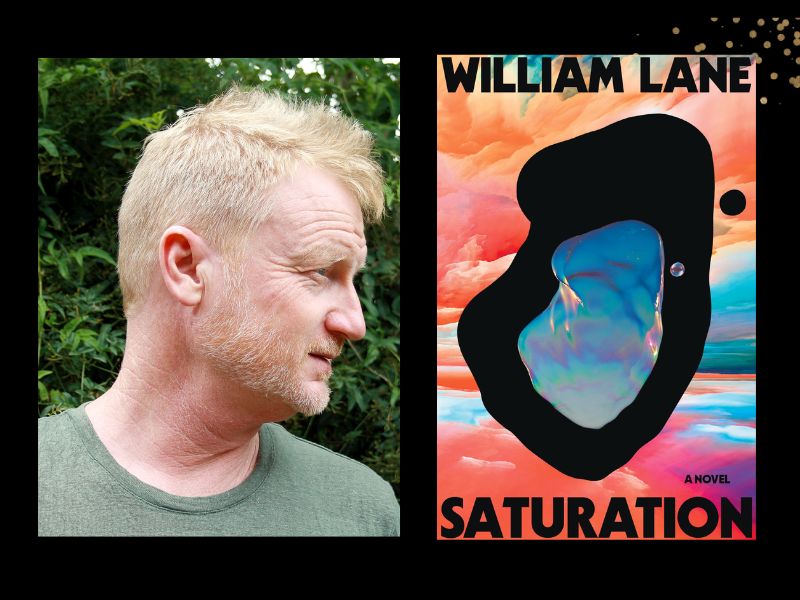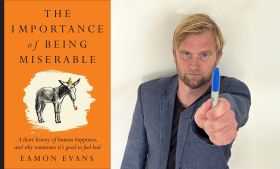The back cover of William Lane’s Saturation states that it is a “startlingly original novel”. It can be assumed that whoever wrote these words hasn’t seen many films or read many books. Early in the novel are concepts seen in Alfonso Cuarón’s film Children of Men and Denis Villeneuve’s Blade Runner 2049, and of course George Orwell’s 1984. Later there are pieces of Paul Verhoeven’s Total Recall, George Miller’s Mad Max universe and even Frank Herbert’s novel Dune. On top of that, there’s a continual undercurrent of World War II documentaries and films and, lastly, pretty well every invasion and violent political upheaval in human history. In short, “startlingly original” elements in this book are in short supply.
The basic story revolves around a couple, Ambrose and Ursula, both librarians, in some not-too-distant future after some kind of calamity has befallen humankind. New cities have been built on top of the old ones, and birth rates have plummeted to the point of children being very rare sights (hence Children of Men). The population gets regular text messages from an entity called Yoremind (hence 1984), telling them of public events and also personal updates in a ‘points’ system that everyone is a part of (you get more points if you participate in public events, often involving witnessing some form of violence or public humiliation of others).
Then a manipulative political leader/dictator enters the story and we see his rise to power. For some reason this dictator sees libraries as the source of all of humanity’s woes and systematically targets them and their staff (trying to erase the past, something that has happened as part of every colonisation and dictatorship in history, so again nothing new). In the course of the book our heroes have a miscarriage, then a son and of course get thrown into political strife since they’re both librarians.
Unfortunately, the only really intriguing aspect of the book is never fully explored – what actually happened to humankind before the world in this book. The leftovers of the contemporary world are seen here and there, most commonly with ‘bones’ emerging from the ground after rain (it never says human bones, just bones). It is fleetingly suggested that the disaster had something to do with overpopulation, and that humans, on a DNA level, had an “urgent adaptation” to make fertility rates plummet, that now “the deep mind is frightened of bearing children” – “no more, not after last time”. This is mentioned early in the book, which is potentially fascinating, but unfortunately the topic is never raised again – the book just lives in the aftermath of whatever it was that happened, in a world where chickens and sheep are extinct, and cows are only seen in the remotest of areas.
A primary problem with the writing style is the descriptive language, or lack thereof. There’s little physical description of characters except for simple adjectives like taller/shorter, older/younger. After reading the entire book, this reviewer still has no mental picture of either of the main couple. The same applies for descriptions of character and emotions, and this becomes problematic when one of them starts crying (why did they suddenly do that?). There are also some wild inconsistencies, such as the wife’s reaction to stranding a dog in a storm (very upset) and when the same dog dies later in the book (she doesn’t seem to care).
Another time, the wife goes to the toilet and has a miscarriage. Simple as that. The husband knocks on the bathroom door and she says that she’s ‘lost’ the child. No drama, no tension, no emotion. Later in the book one of the main characters gets chased by a mob and the next chapter starts a year and a half after the character’s funeral. Again, no drama, tension or emotion. Late in the book, the reader is expected to understand Ursula’s apparently bitter relationship with her mother after reading a couple of paragraphs from her diary. No, the reader needs more than that, quite a lot more. If emotional intensity could be measured in ice-cream flavours, this book never goes past vanilla.
The burning of books and targeting of libraries is, of course, analogous, current and topical in today’s environment of information and misinformation, but the book offers little new to the argument.
Read: Book review: How to Survive 1985, Tegan Bennett Daylight
In summary, the book isn’t bad, it’s just a fairly pedestrian, derivative dystopian political thriller populated with characters whose emotional reactions are questionable and dialogue forgettable. It’s kind of the literary equivalent of having Gold FM in the background – you’ve heard it all before but that’s OK. Many people like books like that, so I hope those people find Lane’s work and enjoy it.
Saturation, William Lane
Publisher: Transit Lounge
ISBN: 9781923023352
Pages: 288pp
RRP: $32.99
Publication date: 1 May 2025






